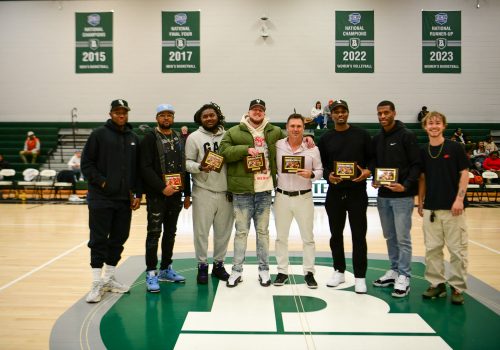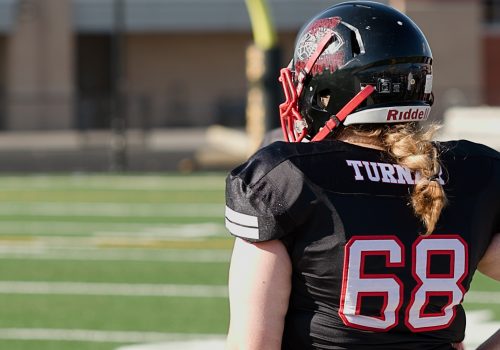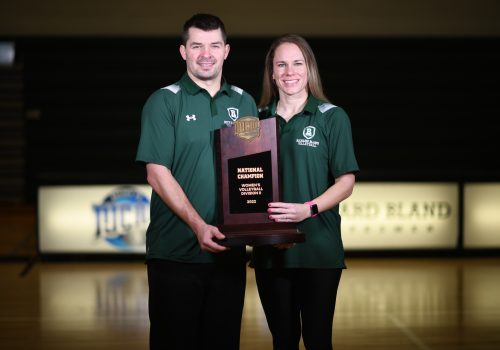Coaching Tandem Elevates RBC Volleyball to National Prominence

In the days leading up to the NJCAA Division II Region 10 Championships, which will be hosted at Richard Bland College of William & Mary on Nov. 1 – 2, we sat down with the couple-coach tandem, Stephanie Champine and Shaun Dryden. The duo has elevated the RBC women’s volleyball program to national notoriety.
By Sterling Giles
Women’s volleyball coaches Stephanie Champine and Shaun Dryden are synonymous with excellence. The duo has elevated their programs from obscurity to national powerhouses.
Champine and Dryden, who serve as Head Coach and Associate Head Coach respectively, have been a package deal with every stop they’ve made over the last six years and it has paid dividends. Just prior to coaching at Richard Bland College of William & Mary (RBC), they coached at a two-year community college in Ohio.
Champine’s collegiate journey began at Owens Community College (OCC). In 2016, she was inducted into the inaugural OCC Athletics Hall of Fame class and is still the only OCC woman athlete to have her jersey retired. The same year, she was inducted into the hall of fame of her other alma mater, Austin Peay State University.
Dryden first attended Los Angeles Piece College and eventually matriculated to Indiana University-Purdue University Fort Wayne. Today, he plays professionally in the Volleyball League of America.
It was fating Champine and Dryden first met at a volleyball tournament. The couple, who tied the knot in 2021, instantly clicked and started competing in tournaments together.
“Anytime we stepped foot in the gym for a tournament, they’d say ‘They’re in the finals or winning it,’” Dryden said with chuckle.
After their three-year stint in Ohio, Champine and Dryden no longer wanted to be limited to just indoor volleyball—they wanted to coach beach volleyball as well.
“Beach volleyball is gaining popularity more and more across all the divisions,” Champine said. “And having it at the two-year level is just another way to increase opportunities for players to get recruited.”
The couple decided to trek east to Richard Bland College of William & Mary in South Prince George, Va, a school with ties to one of the premier four-year public institutions in the country—William & Mary.
The College’s location was perfect. It’s only a few hours south of Washington, D.C. and roughly an hour from the picturesque beaches in the southeast and the mountainous valleys in the northwest.
Champine and Dryden was excited about taking on the new challenge in their new home.
“In about a week, we packed up everything and moved to Virginia,” Champine said. “We were moving out during a snowstorm and the next day we had beach volleyball practice at RBC.”
In order to elevate Richard Bland College’s volleyball program to the next level, a rebuild was needed. Champine and Dryden established a new structure and methodology to continue their standard of excellence at the College.
“We love doing what we’re doing—especially looking for hidden gems,” Champine said. “We’re about building relationships with awesome talent who are willing to take the untraditional route to develop their skillset at a competitive, championship level.”
Over the course of their first season in 2022, the team finished 34-3 (12-0 in conference play) and made it all the way to the NJCAA Division II National Championship in a faceoff against Scottsdale Community College. In a hard-fought match, the Lady Statesmen came out victorious. They made history by becoming the first-ever RBC volleyball team to win a national championship. The perfect Cinderella story.
“The moment we secured that final point in the fifth set of the championship match is something that will stay with us forever,” Champine said. “It was the culmination of countless hours of hard work, dedication and commitment from our athletes who fully embraced the process.”
That year, Champine was named NJCAA Division II Region 10 Coach of the Year, NJCAA Division II National Championship Coach of the Tournament, NJCAA Division II Coach of the Year and AVCA Region Coach of the Year.
“Stephanie has a clear vision and a precise approach to how things should be done,” Dryden said. “She motivates and inspires the players to leave their comfort zones—and that’s when the magic happens.”
But despite the monumental success, the team’s recruitment process the following season was equally as challenging.
“Junior college players have a different pathway to success to get to the same result,” Champine said. “We serve as a steppingstone—a way to open more doors and get them recruited on high-level teams.”
“There have been MLB (Major League Baseball) Hall of Famers, NFL MVPs (National Football League Most Value Players), Olympic medalists and more that have come from junior colleges. Shaun and I are proud community college alums. It’s where we come from and will continue to advocate for.”
According to Champine and Dryden, in their respective hometowns, the sports culture sees more student-athletes taking the community college route versus four-year institutions. It’s viewed as a just path to bolster their athletic talents and academic success prior to attending a four-year institution. In fact, students who decide to go on this tract are more attractive to four-year coaches because the coaches don’t have to work through the growing pains of molding first- and second-year athletes.
Despite the recruitment challenges, Champine and Dryden are discerning in their selections and have had nationally ranked teams each year of their RBC tenure.
“So far, we’ve already produced eight All-Americans, two of which now play Division I,” Dryden said. “Moving forward, we’re going to focus our efforts on recruiting internationally as well.”
RBC Director of Student Life and Athletics Scott Newton also sang the coaching tandem’s praises.
“To compete for the national championship year in and year out, you need coaches who recruit the right athletes and who are able to develop them in their time here at RBC,” he said. “Our coaches have proven to be able to do that on a consistent basis.”
This year’s team is unique because it’s very young—12 of the players on the 15-person roster are first-year students. But the standard of excellence never wavered. As of this writing, the team is 26-1 (11-0) and ranked fifth in the nation. Notably, in May of this year, the beach volleyball team made it to the national championship. But they unfortunately fell to the 2023 champs, Palm Beach State College.
“We have athletes who could have easily committed to a four-year program straight out of high school, but they chose to train with us knowing that it would open up even greater opportunities,” Champine said. “Those same roster spots will still be there, but after a few years of development with us, they’ll now have access to higher-level options and even more opportunities than before.”
Champine and Dryden have a holistic approach to their coaching. They stay on top of their athletes on and off the court, which has translated to their academics as well. The team recently received the prestigious American Volleyball Coaches Association (AVCA) Team Academic Award. The distinction recognizes high school and college volleyball teams across the country that have at least a 3.3 GPA on a 4.0 scale for the academic year.
Although their standards are high, the couple is very understanding and consummate confidants for their players. First-year standout Taelin Connolley spoke highly about how the coaching tandem empowers her in a sport that requires a great deal of mental and physical fortitude. Connolley, an outside hitter and defensive specialist, is currently No. 1 in the Region 10 Conference and No. 16 in the nation for total kills.
“The team dynamic is really intertwined and is rooted in competition and academic excellence,” she said. “It’s been uplifting for me personally.
“It’s a comforting feeling here—it feels like home.”
The Richard Bland College volleyball team also prioritizes team-building experiences, which helps strengthen chemistry.
“Our strength as a team comes from lifting each other up,” Dryden said. “The bond we form off the court makes us so much stronger on the court.”
“We prioritize supporting one another and our office is a safe space where players know they’re always welcome,” Champine added. “We’re all about creating a full, meaningful experience and enjoying the journey with our athletes.”
Champine and Dryden pointed out the seamless symbiotic relationship between them and their athletes is based on discipline and the desire to be successful. Everyone is bought in and eager to excel.
“We always push for getting one percent better every time we touch the court,” Champine said. “That may not sound like a lot, but by the end of the season, we’re firing on all cylinders.”


